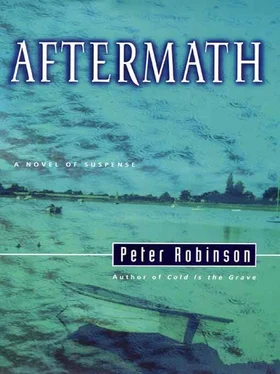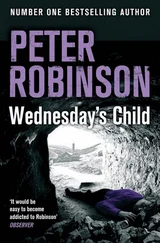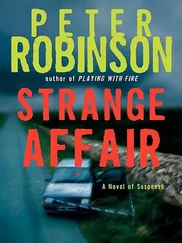“Should she be seeing a psychologist?”
“Probably. But that’s her decision. Or her parents’.”
“Could you recommend someone? I mean, if they’re interested.”
Dr. Simms wrote a name on a slip of paper. “She’s good,” she said. “Now, off you go. I’ve got my next patient waiting.”
They arranged another appointment and Maggie walked out into Park Square thinking about Claire and Kimberley and human monsters. That numb sensation had come back, the feeling that the world was at a distance, through mirrors and filters, cotton wool, through the wrong end of the telescope. She felt like an alien in human form. She wanted to go back to where she came from, but she didn’t know where it was anymore.
She walked down to City Square, past the statue of the Black Prince and the nymphs bearing their torches, then she leaned against the wall near the bus stop on Boar Lane and lit a cigarette. The elderly woman beside her gave her a curious look. Why was it, Maggie wondered, that she always felt worse after these sessions with Dr. Simms than she did before she went?
The bus arrived. Maggie trod out her cigarette and got on.
The drive to Eastvale went smoothly enough. Banks ordered an unmarked car and driver from Millgarth and left through a side exit with Julia Ford and Lucy Payne. They didn’t run into any reporters. During the journey Banks sat in the front with the driver, a young female DC, and Julia Ford and Lucy Payne sat in the back. Nobody spoke a word. Banks was preoccupied by the discovery of another body in the Payne’s back garden, news he had just received from Stefan Nowak on his mobile as they set off from the infirmary. That made one body too many, and by the sound of it, he didn’t think this one was Leanne Wray’s either.
Occasionally, Banks caught a glimpse of Lucy in the rearview mirror and saw that she was mostly gazing out of the window. He couldn’t read her expression. Just to be on the safe side, they entered the Eastvale Police Station through the rear entrance. Banks settled Lucy and Julia in an interview room and went to his office, where he walked over to the window and lit a cigarette and prepared himself for the coming interview.
He had been so preoccupied with the extra body on the journey up that he had hardly noticed it was another gorgeous day out there. There were plenty of cars and coaches parked on the cobbled market square, family groups milling about, holding on to their children’s hands, women with cardigans fastened loosely by the sleeves around their necks, just in case a cool breeze sprang up, clutching umbrellas against the possibility of rain. Why is it we English can never quite entrust ourselves to believe that fine weather will last? Banks wondered. We’re always expecting the worst. That was why the forecasters covered all bases: sunny with cloudy periods and chance of a shower.
The interview room smelled of disinfectant because its last inhabitant, a drunken seventeen-year-old joyrider, had puked up a take-away pizza all over the floor. Other than that, the room was clean enough, though very little light filtered in through the high barred window. Banks inserted tapes in the machine, tested them, and then went through the immediate formalities of time, date and those present.
“Right, Lucy,” he said when he’d finished. “Ready to begin?”
“If you like.”
“How long have you been living in Leeds?”
“What?”
Banks repeated the question. Lucy looked puzzled by it but said, “Four years, more or less. Ever since I started working at the bank.”
“And you came from Hull, from your foster parents Clive and Hilary Liversedge?”
“Yes. You know that already.”
“Just getting the background clear, Lucy. Where did you live before then?”
Lucy started to fidget with her wedding ring. “Alderthorpe,” she said quietly. “I lived at number four Spurn Road.”
“And your parents?”
“Yes.”
“Yes what?”
“Yes, they lived there, too.”
Banks sighed. “Don’t play games with me, Lucy. This is a serious business.”
“Don’t you think I know that?” Lucy snapped. “You drag me out of hospital all the way up here for no reason, and then you start asking about my childhood. You’re not a psychiatrist.”
“I’m just interested, that’s all.”
“Well, it wasn’t very interesting. Yes, they abused me, and yes, I was taken into care. The Liversedges were good to me, but it’s not as if they were my real parents or anything. When the time came, I wanted to go out on my own in the world, put my childhood behind me and make my own way. Is there anything wrong with that?”
“No,” said Banks. He wanted to find out more about Lucy’s childhood, especially the events that occurred when she was twelve, but he knew he wasn’t likely to find out much from her. “Is that why you changed your name from Linda Godwin to Lucy Liversedge?”
“Yes. Reporters kept bothering me. The Liversedges arranged it with the social services.”
“What made you choose to move to Leeds?”
“That’s where the job was.”
“The first one you applied for?”
“That I really wanted. Yes.”
“Where did you live?”
“I had a flat off Tong Road at first. When Terry got the job at Silverhill, we bought the house on The Hill. The one you say I can’t go back to, even though it’s my home. I suppose you expect me to keep making the mortgage payments while your men rip the place apart, too?”
“You moved in together before you were married?”
“We already knew we were getting married. It was such a good deal at the time that we’d have been fools to turn it down.”
“When did you marry Terry?”
“Just last year. The twenty-second of May. We’d been going out together since the summer before.”
“How did you meet him?”
“What does that matter?”
“I’m just curious. Surely it’s a harmless question.”
“In a pub.”
“Which pub?”
“I can’t remember what it was called. It was a big one, though, with live music.”
“Where was it?”
“Seacroft.”
“Was he by himself?”
“I think so. Why?”
“Did he chat you up?”
“Not in so many words. I don’t remember.”
“Did you ever stay at his flat?”
“Yes, of course I did. It wasn’t wrong. We were in love. We were going to get married. We were engaged.”
“Even then?”
“It was love at first sight. You might not believe me, but it was. We’d only been going out two weeks when he bought me my engagement ring. It cost nearly a thousand pounds.”
“Did he have other girlfriends?”
“Not when we met.”
“But before?”
“I suppose so. I didn’t make a fuss about it. I assumed he’s led a pretty normal life.”
“Normal?”
“Why not?”
“Did you ever see any evidence of other women in his flat?”
“No.”
“What were you doing in Seacroft when you lived off Tong Road? It’s a long way.”
“We’d just finished a week’s training course in town and one of the girls said it was a good place for a night out.”
“Had you heard of the man the papers at the time called the Seacroft Rapist?”
“Yes. Everybody had.”
“But it didn’t stop you going to Seacroft.”
“You have to live your life. You can’t let fear get the better of you, or a woman wouldn’t even dare go out of the house alone.”
“That’s true enough,” said Banks. “So you never suspected that this man you met might be the Seacroft Rapist?”
“Terry? No, of course not. Why should I?”
“Was there nothing at all in Terry’s behavior that gave you cause for concern?”
Читать дальше












